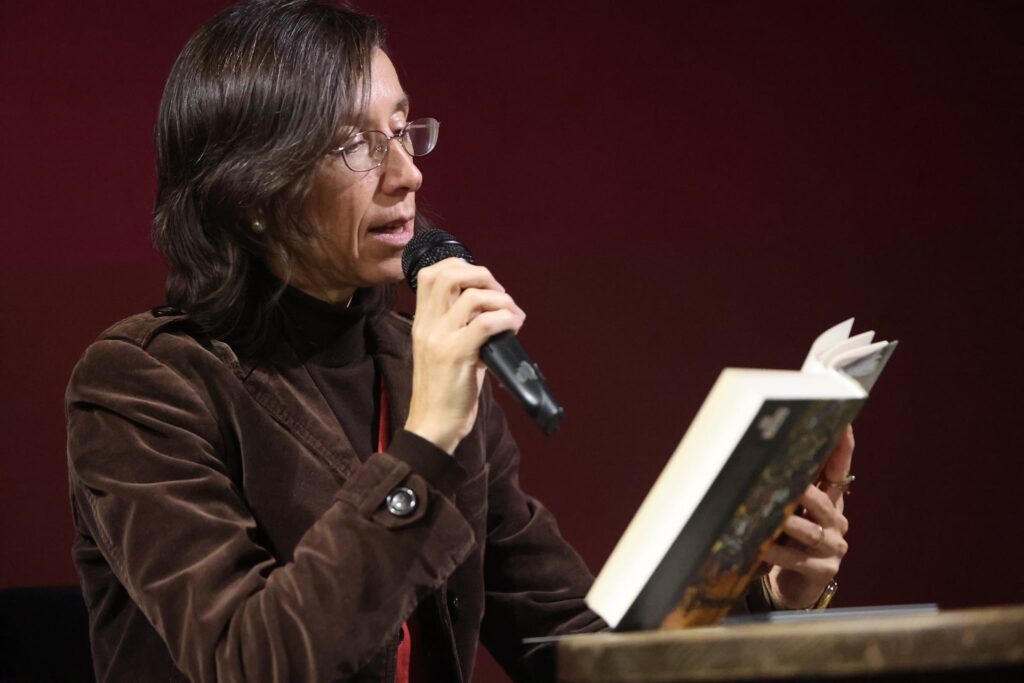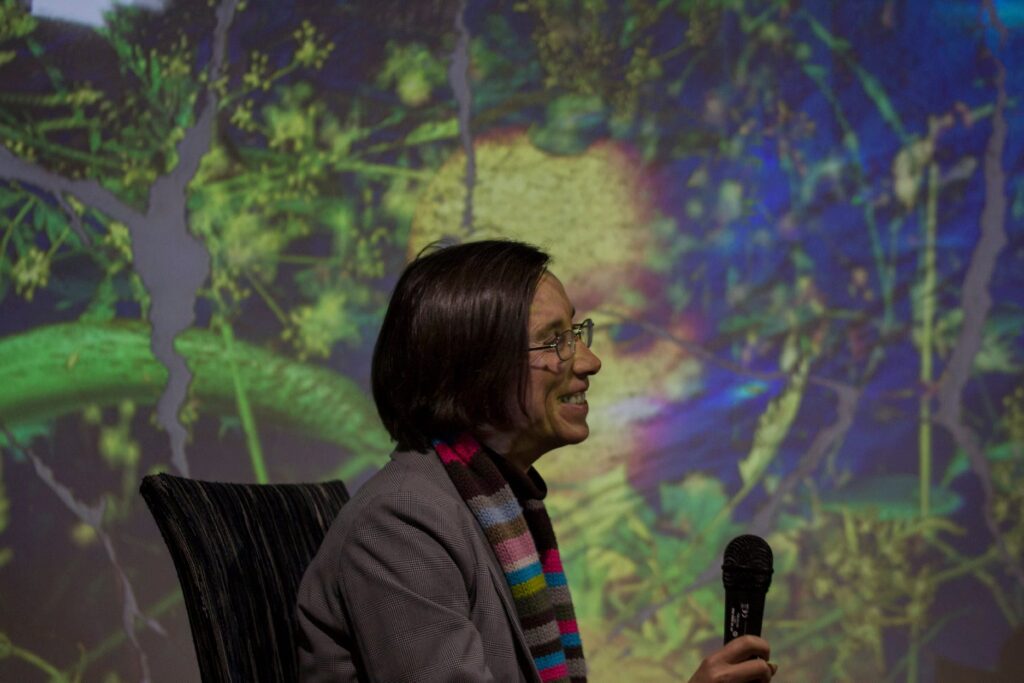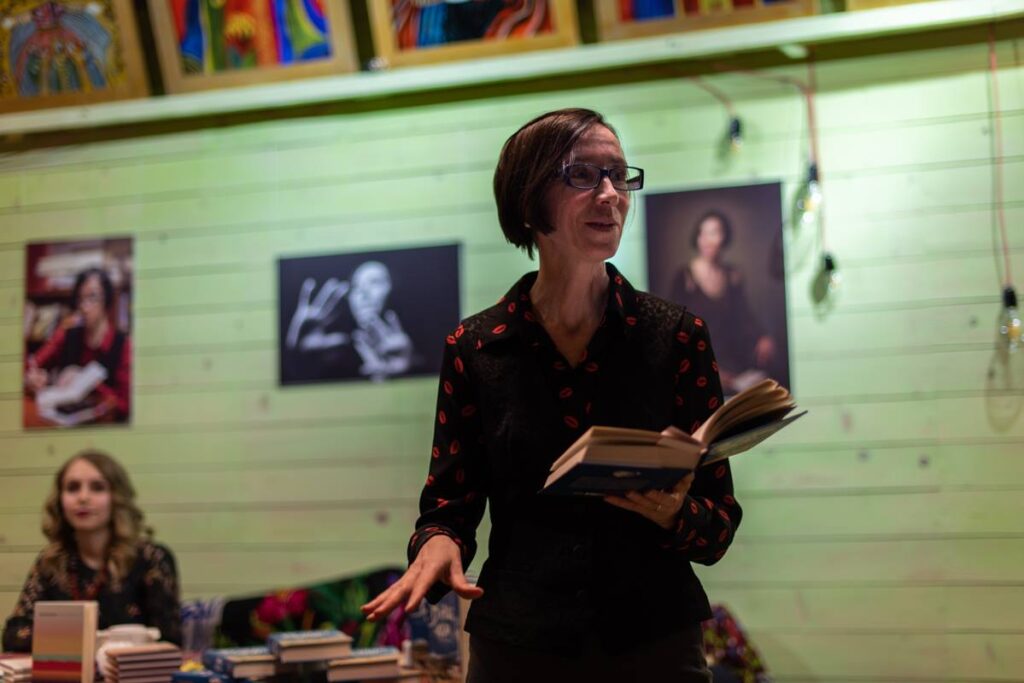
We are publishing a continuation of the conversation between writer and publisher Roman Malynovskyi and poet, writer, and translator Halyna Petrosaniak.
Please see the first part of the interview here.
Let’s talk about the war in terms of culture. I want to talk about canceling of Russian culture in the world—a shaky process resulting in many points of view globally. What do you think about it, what do you consider reasonable? How do you define it for yourself today?
For myself, I have already defined it long ago, even before the 2014 war:
We should have gotten rid of our dependence on Russian culture a long time ago.
It is clear that it was important for us, it shaped the older generation to a great extent. We, the people coming from the Soviet Union, could not escape Soviet patterns and cultural codes. And those codes were primarily Russian. We did not avoid Russian classic writers: for example, I studied their literature at the institute. Although I don’t feel like there is much left in me from Tolstoy or Dostoevsky, I remember all those classes, that is, there is a certain layer of it in me. This is not to mention my sincere admiration for Brodsky or Nabokov whom I loved to read.
But now we have to give it up. We have an internal right to do so. We did not rob Russian culture by using it. On the contrary, we enriched and supported this flame, which spread to the whole world. But now is the best time to give it up.
These are very subtle matters, everyone decides for themselves when enough is enough. No more quotes from Vysotsky, Dostoevsky, Nabokov, Petrov, and Ilf, no more quotes from Russian movies, no more Cheburashkas, Winnie the Poohs, etc.
We need this to distance ourselves from Russia. We have to stop picking those apples that fall from their garden into ours, stop consuming and admiring it all. We have to do our own thing and create our own values in literature and art. What is happening now, this canceling of Russian culture (actually, only an attempt at it, more talk than action, because in Switzerland and Germany, all the books by Dostoevsky and Tolstoy remained in the curriculums) is impossible to implement right away. However, we should encourage it and do it in a balanced way, without being guided by aggression and emotions. Arguments must be strong, everyone must formulate them internally: why I don’t want Tolstoy, Dostoevsky, Nabokov, and Brodsky anymore. And there are plenty of them: you can show their true values (among the good ones there were bad ones)—imperialism, supremacy, aggression towards other peoples of the former USSR, whom they thought of as part of their common space. We have to find it in their pieces, take it out and quote it as examples. This is what Dostoevsky, whom you love so much, wrote. And here is Tolstoy, whom you admire. Here is Brodsky’s On Ukrainian Independence, here is Nabokov, who wrote that «it is good that Gogol did not remain a Khokhol, but became a Russian writer.»
Or even do it this way: to take out about Dostoevsky what he wrote about the Germans and the Swiss, that they are fallen, dirty, and stupid. This will be a proof and will make them think because people in Western Europe are open-minded, and if they hear a worthy and strong argument, they tend to change their preferences and opinions.
You reached the novel form gradually, through essays and short stories. And there came Villa Anemona. Once, in a conversation with Izdryk, you said that fiction requires artistry, which you did not feel you had at that time. What has changed since then? Please tell when you felt that you were ready for a novel.
As I have already told you, I’m a timid person. For quite a long time, I did not dare to write prose precisely because I believed and still believe that artistry (if not a prerequisite for a good prose writer) greatly contributes to fiction. I personally really like authors who are actors at the same time, who can play their characters and transform into each of them. They do not observe from the outside describing. But embody and play from within their characters, adopting their habits and language. It is always very organic, I appreciate this feature in literature and always choose those books for translation that are written this way.

Photo by Yurii Rylchuk
I hesitated for a long time. I wanted to start and at the same time did not want to. You noticed correctly—I started with short stories. I thought I would try to see what would come out of it, and then maybe… On the one hand, I learned something, for example, to write prose better than I would have done it 20 years ago. On the other hand, I somewhat overestimated my approach: after all, there are writers who were not «actors», but people still read them. And I also rethought literary hierarchies:
Prose should not always be intended for highbrow intellectuals, there should be prose for readers who want to spend two hours in peace and understand everything they read, without bothering with philosophical and complexly formulated things. Most of them are like that, and that’s good.
Those who are not readers yet need something that is not very sophisticated or complicated, multi-layered, but something of high quality and, at the same time, simply and easily written. A story is important for such a book because we like to listen and tell stories, we need them.
When I put it all together, I thought I could start. And I also understood that I had relatively plenty of time: I had peace and all the conditions for writing. There was no other option. That’s why I wrote my Villa Anemona. The novel was published last autumn, then the full-scale war began and it was not the case anymore, so, unfortunately, I didn’t hear much feedback about it. But what I heard was positive.
You talk about «easy prose», but the central theme of the novel is euthanasia. And this is a way to talk about life and death, about a person at the crucial point, when a decision is made, on which it literally depends: to live or die. This is a viscous topic. How was it for you to work with it?
In fact, this topic concerns everyone. In this regard, it is for the general public. Everyone will understand what it is about and all pros and cons of this phenomenon. For me, to write about it was, let’s say, interesting and tense. Sometimes I was surprised to feel the magical essence of writing and find myself at a crossroads. I was afraid of the possibilities that open up in prose.
I approach creativity soberly and I don’t think that someone out there «writes with my hand», but sometimes I feel the magic of writing and that I’m really creating some kind of world, an environment that probably does not just appear, but has its internal laws, springs, over which I did not know whether I had control.
I felt this for the first time while writing Villa Anemona. And to a large extent, it guided me, although I tried to keep it within my own limits, to dominate as an author, not to let the book go beyond my perception. There was such a danger: everything went the way I didn’t want it to. In such cases, I threw out whole fragments.
I’m aware that the book can cause many disputes and they are not new, they are going on all the time. They are ideological and depend on the perception of life and the world by each individual person: whether they believe in God, or that the world has simply emerged by itself and all the cards are in the people’s hands. There are many nuances here, and if we arrange a discussion on the book’s topic, one can argue with a lot of people, as it usually happens in the media field, risking being defined as retrograde and ignorant. However, I ignored that and wrote the book the way I wanted to do it.

Photo by Rostyslav Shpuk
Writing poetry and writing prose are different processes. Is it hard to stop being a poet when you’re writing a prose book?
Yes, it is a different kind of writing, and everyone who writes and thinks about it understands it. Poems require a dense, but short, time-limited experience. With prose it is different, you have to be disciplined and stick close to the book because when you take a break for several weeks, then you have to enter this world anew: to remember and form its logic. Long pauses in writing prose seem unproductive to me. You have to stay in the book.
Now I’m returning to you as a translator. You always carefully choose the authors you work with. A book of your translations of sonnets by Rainer Maria Rilke has just been published. This is not the first translation of them, but for the first time, they were translated into Ukrainian by a woman, which you repeatedly mentioned. Why is it important for you to emphasize this?
Now, in the context of the current gender frameworks, it is interesting, because, despite all the equality, women and men perceive the world a little differently. To put it superficially: they interpret the world in a different way and put different feelings into the same thing. I think it is interesting when a woman translates poetry written by a man and vice versa. Is there female and male poetry? This can also be discussed.
For me, it’s always about a person. I have always positioned myself first of all this way. What this person is like, that’s another matter. In communication, it never matters to me whether it is a woman or a man. There were cases when it created obstacles in life. When in Ukraine I wanted to smile at someone on the street, and it was a man, it could be misinterpreted.
Therefore, the fact that this is the first translation done by a woman is not the main thing. The main thing is that Rilke somehow attracted me to him against my will. I understand that the existing translations by Mykola Bazhan, Vasyl Stus, and Bohdan Kravtsiv are a strong argument not to even try to translate Rilke’s sonnets. But in January 2021, I happened to hear a sonnet from the second part: the eighth, The Unicorn, on the German radio. It has another title, but it’s about a unicorn. After hearing it, I thought that I wanted to find a Ukrainian translation. And I found one by Bazhan. Despite the fact that he was a brilliant translator and expert on Rilke and the German language, the translation did not seem perfect to me. The first line seemed to be conveyed completely inadequately. And I tried to find my version, which would be correct. After two days of circling around that first line, I found, in my opinion, a better equivalent than Bazhan. And this inspired me: if I managed to translate the line better than Bazhan, then maybe I should try other sonnets.
First, I translated the sonnet about a unicorn. Then—the next one that I liked. I translated them randomly. It was winter, gray and dark, which was unfavorable for traveling, so I spent much time at home. Little by little, I translated 8 sonnets. I was wondering how many there were of them in total—I saw that there were 55. I was struggling myself: should I quit it or continue? I saw that I was good at it, so I continued.
I translated them by autumn, and fortunately, decided to show them to Andrukhovych. At one time, he translated Rilke brilliantly. I remember myself in the 1990s enthusiastically learning those translations by heart. I sent him my sonnets, which I thought were ready. Yurii politely responded that the translation was no good and that it still needed to be refined. I cared more about the content, digging into what Rilke sent us and what his messages were. I focused on that and only roughly considered the size of the poems. Andrukhovych drew my attention to the fact that those were sonnets, a classical form, and I could not afford to deviate from the original size. All the syllables had to be counted and stressed in the same way. There could be no compromises.
It made me very upset. It was a blow, although I should have understood and known it myself. Secondly, I had neither strength, ideas, nor desire to start everything from scratch, because I thought that the work had already been done. At first, I thought I would refuse to finish them and just quit that thing. But little by little, starting with the very Unicorn, I began to adjust my translation to the rhythm and original size. After two or three, everything went great. Andrukhovych advised me to find a good editor and work with him. I found an editor in Yaroslav Dovhan, who, although he has not translated Rilke and is not an expert in German, is a very good specialist in Ukrainian and knows syllabo-tonic versification and poetic sizes well. We made this book together: he proofread, helped me and offered his edits. Also, this book is a design work by Olena Rubanovska, who created a perfect cover that corresponds to both the sonnets and the present time.

Photo by Dmytro Petryna
What is the place of Rilke in your aesthetic worldview?
As I’ve already said, at the end of the 90s, I read Rilke not only translated by Andrukhovych, but also by other translators. Then, when I learned the language well enough, I tried to read the original works. But she truly discovered Rilke for herself only now, because he is a mature poet, he was already such a poet even in his youth. However, I truly discovered Rilke only now, because he is a mature poet, he was such a poet even when he was young. He has no frivolous, playful, or simply beautiful poems. They always have depth, space for thought, philosophy, and choice. There is always something intellectual and metaphysical in it. In his youth, Rilke wrote what can be called religious poetry. At the same time, in his poems, there is a lot of the outside world and life, but also a lot of metaphysics. The topics are also relevant for us: technical progress, the role of machines in people’s lives and the way they take over power over people. The poems were written 100 years ago—by the way, Rilke wrote them in the winter of 1922—so the book was published right in time to mark the centenary of the birth of those sonnets.
I became interested in his biography. As experience shows, to get to know the author best, you have to read his diaries and letters. And so, I read Rilke’s correspondence with his mother and other responders, it gave me a more intimate view of him, and I got to know him better. I even visited Château de Muzot, the northern tower where those sonnets were written, and felt the atmosphere in which Rilke lived at that time. It enriched me and gave me a better understanding of his writing and personality.
I will conclude our conversation by returning to everyday life. What are you reading now? What was the last movie or play you watched? What kind of music do you listen to?
I hardly watch movies now. My movie time has passed. My last great passion was Czech cinematography, partly from the socialist period—Jiří Menzel, Zdenek Sverak and his son Jan Sverak. These are films based on prose pieces by Bohumil Hrabal, such as Cutting It Short and I Served the King of England.
In literature, I’m always looking for what I want to translate—that’s what forms my reading experience. The last thing I read was a book by Austrian author Radek Knapp, I really liked it. Another, quite different, book is by Peter Bieri, a Swiss author who has a non-fiction piece dedicated to the concept of dignity. This is a valuable book for me, it made me think and argue with the author. And I disagree with him in many ways.
Recently, in Ukraine, I ordered books from publishing houses with which I cooperate: Discursus, 21-Publishers, and Pyramid. On August 24, in Zurich, I had a reading dedicated to the Independence Day of Ukraine, and I took with me a whole box of books which I gave to my friends as gifts.
From Ukrainian literature, I’m reading a book titled The Servant from Dobromyl by Halyna Pahutiak. This is thick, high-quality prose that keeps a reader within its world. The author has interesting historical knowledge. I have three more of her books, which I will first read myself and then give as a gift to one of the Ukrainian women in Basel or Zurich.
Main photo by Rostyslav Shpuk


